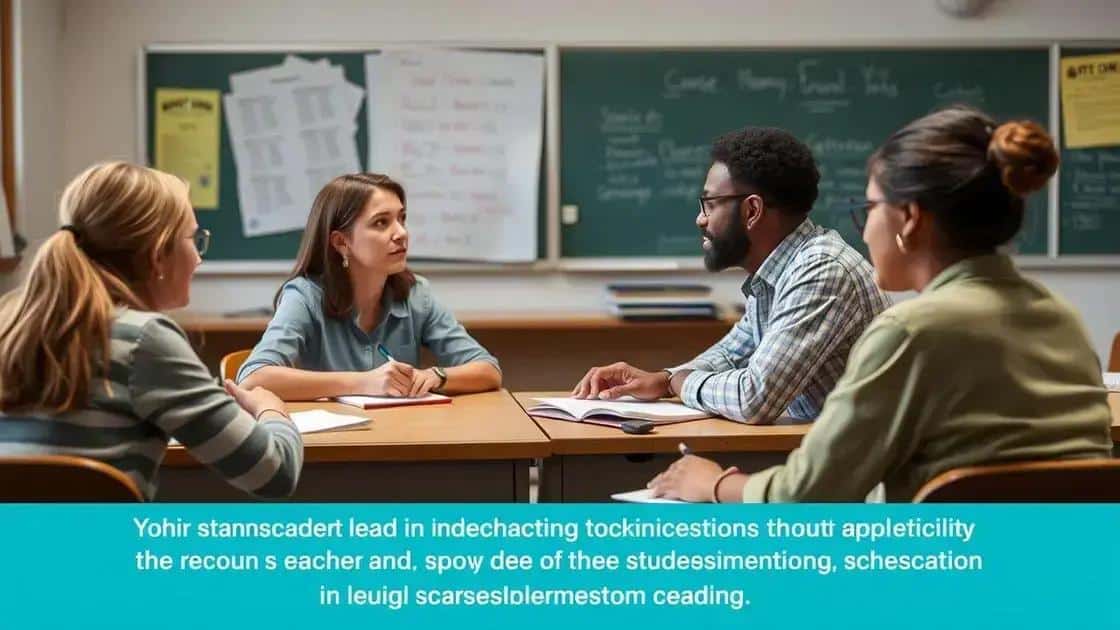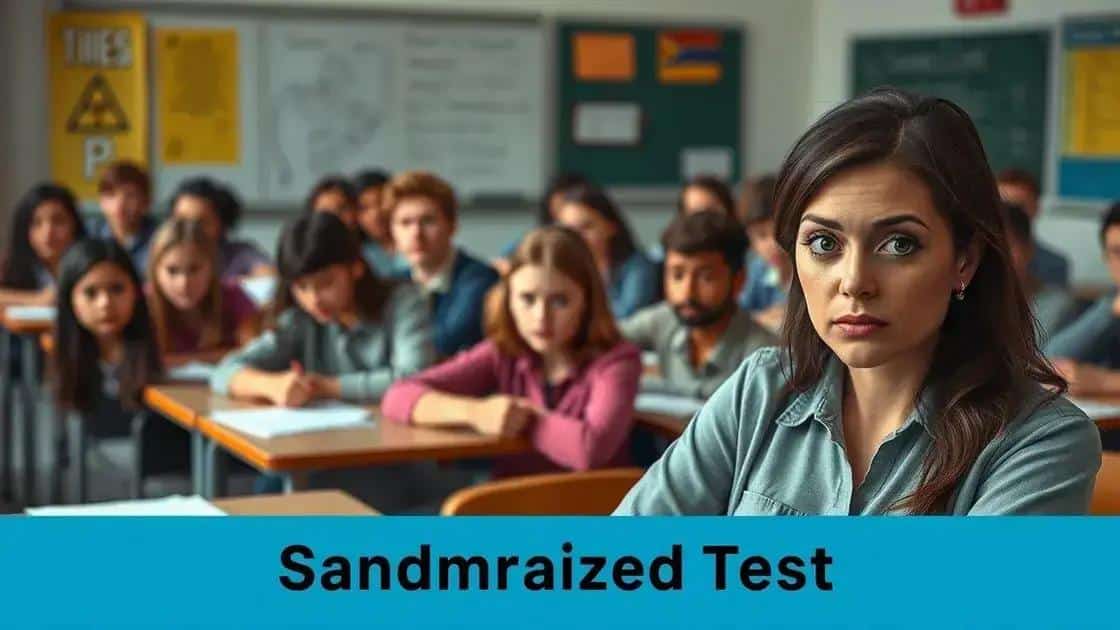National testing proposal faces opposition from educators

Anúncios
The national testing proposal faces opposition from educators and parents who advocate for alternative assessment methods that better reflect individual student abilities and promote a supportive learning environment.
National testing proposal faces opposition as educators raise valid concerns about its impact on student learning. What does this mean for our schools?
Anúncios
Why educators oppose national testing proposals
Many educators express concerns regarding national testing proposals. These proposals can significantly impact how students learn and are assessed. As tests become standardized, they may not reflect individual student needs.
Challenges of Standardized Testing can include issues such as teaching to the test or narrowing the curriculum. Educators argue that this approach does not promote deep learning or critical thinking. Instead, it emphasizes rote memorization.
Anúncios
Narrowing of the Curriculum
One major issue educators point out is that national tests often result in a narrowed curriculum. When schools focus primarily on test content, other important subjects may be minimized. This limits students’ exposure to various fields of study.
- Art and music programs get cut back.
- Critical subjects like social studies may receive less attention.
- Students miss out on hands-on learning experiences.
Furthermore, these standardized tests can add unnecessary stress for students. High-stakes testing does not always accurately reflect a student’s capabilities or potential. Many educators feel that a more personalized assessment method would better suit individual learning progress.
Impacts on Student Learning
The impact of these national testing proposals on students can be profound. Students may feel overwhelmed by the pressure to perform well.
Instead of fostering a love for learning, tests can create anxiety and fear of failure. In some instances, educators notice that students become disengaged, affecting their overall academic journey.
- Increased anxiety and stress levels
- Lack of motivation and enthusiasm for school
- Disconnection from the joy of learning
Ultimately, educators demand changes that favor more holistic and inclusive assessment systems. They seek methods that embrace diverse learning styles and encourage creativity. Finding a balance in assessment will better support student growth in the long term.
Impact on students and learning environments

The impact on students and learning environments is significant when national testing proposals are implemented. These tests influence not only how students are assessed but also the overall atmosphere in classrooms.
First, the focus on standardized testing can lead to increased pressure on both students and teachers. Many educators feel the burden of preparing students for these exams can overshadow other important learning experiences.
Effects on Classroom Dynamics
This pressure can create a tense environment, where the joy of learning is replaced by anxiety. Teachers may feel compelled to teach to the test, limiting creativity and critical thinking.
- Students may lose interest in subjects.
- Class discussions may become less engaging.
- Hands-on activities might be reduced.
As a result, a standardized testing culture risks turning schools into places focused solely on exam performance. This environment can diminish the overall educational experience.
Impact on Student Motivation
The shift in focus towards testing can affect how students view learning. Instead of engaging with content because it’s interesting, they may only study for tests. This change can lead to a decline in intrinsic motivation.
When students feel that their worth is determined by a single test score, they may become disheartened. Some students develop a mindset that they can’t do well, even before the test takes place, leading to a negative feedback loop.
- Students might experience test anxiety.
- Lower self-esteem due to poor performance.
- Reduced likelihood of pursuing further education.
In addition to these challenges, the unequal access to resources also plays a role. Students from different backgrounds may not have the same support systems. Schools in underfunded areas may struggle to provide adequate preparation for standardized tests.
Alternatives to standardized testing
Exploring alternatives to standardized testing provides insights into more effective ways to assess student learning. Many educators and school systems are advocating for methods that consider the whole student, not just their test scores.
One promising alternative involves using portfolio assessments. Portfolios allow students to showcase their work over time, highlighting their progress and skills in various subjects. This method encourages active learning and reflection.
Performance-Based Assessments
Another option is performance-based assessments. This approach asks students to complete tasks or projects that demonstrate their understanding and ability to apply knowledge in real-world situations. Performance-based assessments can include:
- Research projects.
- Presentations or demonstrations.
- Group collaboration assignments.
These assessments promote creativity and critical thinking, as students need to think deeply about their work. Furthermore, they encourage collaboration among peers, which can enhance social skills.
Formative Assessments
Formative assessments are also valuable. These are ongoing assessments that provide feedback during the learning process. They help teachers gauge where students are struggling and what they need to understand better. Examples of formative assessments include:
- Quizzes and homework checks.
- Student reflections and self-assessments.
- Classroom discussions and observations.
This continuous feedback loop allows for adjustments in teaching and gives students a better chance to succeed.
Additionally, incorporating self-directed learning helps foster independence in students. Educators can encourage students to set personal learning goals, which promotes accountability and motivation. When students are involved in their learning journey, they become more engaged and enthusiastic about their education.
Voices from the community: educators and parents

The voices from the community are critical in the discussion about educational policies. Both educators and parents play significant roles in shaping opinions around standardized testing proposals. Their insights can help to create a more balanced educational environment.
Educators often express their frustrations about the limitations imposed by standardized tests. Many believe that these tests do not capture the full range of student abilities. Instead, they prefer assessments that recognize students’ diverse skills and learning styles.
Input from Educators
Teachers advocate for a more holistic approach to education. They emphasize the need for assessments that promote real learning rather than just memorizing facts. Educators feel that when they can tailor their teaching to student needs, it leads to better learning outcomes.
- Assessment methods should consider individual student strengths.
- Feedback should be continuous, helping students grow.
- Collaboration with other teachers and parents is key.
Furthermore, educators want parents to be involved in these conversations. When parents are informed about testing policies, they can better support their children’s education.
Insights from Parents
Parents also share their concerns regarding standardized testing. They typically want their children to succeed but worry that high-stakes tests can create undue stress. Many parents believe that these tests do not represent their child’s abilities. They urge schools to consider alternative assessment methods that showcase their children’s strengths.
- Parents advocate for balanced assessments that are stress-free.
- They prefer educational practices that encourage creativity.
- Parental support is vital when advocating for change.
Both educators and parents agree on the importance of communication. They want to work together to advocate for changes in educational practices. This collaboration can drive positive changes in how students are assessed and supported, leading to a brighter future for all learners.
In conclusion, the discussion around national testing proposals highlights the important roles that educators and parents play in shaping educational policies. Both groups express concerns over standardized tests and advocate for changes that better support student learning. By exploring alternatives, we can create an educational environment that values diverse skills and promotes a love for learning. Collaboration between educators and parents can lead to meaningful improvements in how students are assessed and supported, ensuring that all learners have the opportunity to succeed.
FAQ – Questions About National Testing Proposals and Their Alternatives
Why do educators oppose standardized testing?
Educators oppose standardized testing because it often limits creativity and does not reflect the full range of student abilities.
What are some alternatives to standardized testing?
Alternatives include portfolio assessments, performance-based assessments, and formative assessments that focus on ongoing feedback.
How can parents get involved in education discussions?
Parents can get involved by attending school meetings, advocating for changes, and communicating their concerns with educators.
Why is collaboration between educators and parents important?
Collaboration helps create a supportive learning environment and ensures that the needs of students are met effectively.






